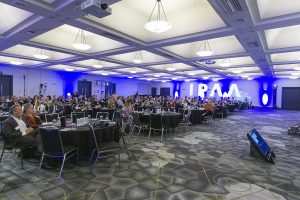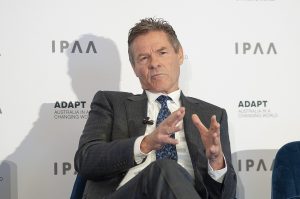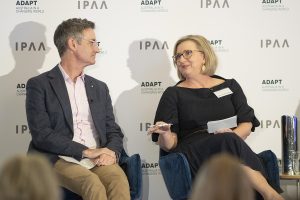Adaptability, Trust and Authenticity in Public Service: A New Era of Learning?
Highlights from the 2022 IPAA National Conference

Governments at all levels in Australia, and indeed around the world, continue to experience the impacts of changing and polarising geopolitics, international tensions, economic instability, transformative and rapidly evolving technologies, emerging sciences, and data (in)security, as well as the ongoing and as yet unknown long-term impacts of COVID-19.
But what does this mean for public sector leadership?
The Annual IPAA National Conference provides a rare space for frank and fearless conversation about the challenges and opportunities of delivering public services and supporting good public policy.
The 2022 conference presented a wide-range of senior leaders from the Commonwealth and State public sectors, as well as think-tanks, national and international enterprise and academia. Notwithstanding the diversity in the two-day plenary program, there were common themes evident from these practitioners and contemporary thinkers that are important for all of us to keep top of mind as we progress our public purpose work. Some key examples are described below.
Australia’s Chief Scientist Dr Cathy Foley who, along with advances from emerging sciences, discussed the need to build a culture of trust, transparency and curiosity through open data and research, and the importance of leaders demonstrating collaboration and promoting collective efforts between industries and stakeholders.
Dr Foley also discussed the potential for the social sciences to contribute to improving public acceptance of science based policy, but it was her emphasis on purposefully developing cultures of openness and curiosity that was thought-provoking and highlighted a key theme from the conference.
The Australian Electoral Commission (AEC) discharges the important task of guarding Australia’s democracy through one of the most complex peacetime events led by the public service. AEC Commissioner Tom Rogers highlighted the key to attaining the trust of Australia’s citizens has been a clear and concerted strategy around reputation management, understanding stakeholders, and taking a proactive approach to overcoming disinformation.
The Commissioner’s remarks suggest that trust, transparency and a characteristic authenticity are, increasingly, essential capabilities for public administrators.
The team from interdisciplinary think-tank Future Crunch, introduced the concept of an “Adaptability Quotient” – the ability to quickly discern what’s relevant, unlearn obsolete knowledge, and flourish in an environment of fast and frequent change.
According to Harvard Business Review, adaptability is the new “competitive advantage”. The concept certainly resonated with many in the room. Regardless of your stance on such concepts (think IQ and EQ), it is clear that the capacity for leaders and organisations to adapt is core, in a world where concurrent and sequential crises, 24/7 news cycles, divisive political landscapes, and public expectations for responsive government are ever-present.
IPAA Queensland also delved into this topic at the 2019 Chief Executives and Young Professionals Breakfast (check out more here). However, there is still a lot more work to be done to develop our understanding of how adaptability can be learned or taught.
Throughout the conference, it was clear that the chosen theme of adaptability is indeed a dominant characteristic of current times. Or at least it dominates the

conversation about public sector capability. This was further extended by explorations into how deep listening, and engendering a culture of trust and responsibility, can lead to improved perceptions of the service amongst citizens.
The Australian Public Service Commissioner Peter Woolcott AO added further depth to the conversation through his reflections and insights on developing and responsibly discharging “soft power”. From his distinguished career in public service, and particularly in diplomacy, he discussed the complexity behind persuasion and influence, and how power can manifest in various forms (culturally, politically and through expressions of values). Again, listening and relationship building surfaced as essential skills for negotiating such complex terrain.
Trust was brought into even clearer focus through a candid and thoughtful panel discussion on putting the “us” back in trust with new ANZSOG Dean and CEO Adam Fennessy PSM, Secretary for Public Sector Reform Dr Gordon de Brouwer, Queensland Public Service Commission Deputy Commissioner Megan Barry, and NSW Auditor-General Margaret Crawford. The collective wisdom of the panel reaffirmed that if public service leaders model authenticity and accountability, and are supported to do so by governments, the foundations for building the trust of citizens will follow. The permission to admit mistakes and take responsibility as public service leaders was refreshing and reiterated the power of role-modelling as a tool for positive cultural change.

Finally, for Australian Public Service (APS) attendees (and sector reform buffs) the opportunity to hear announcements on APS workforce reform direct from the responsible Minster, Senator the Honourable Katy Gallagher, at the profession’s key annual national conference, was a welcome demonstration of respect for the service.
To sum up – key themes from the two days of plenary keynotes and panels included:
- Culture remains a key concern for public sector leaders, both as a mechanism for building the capacity and capability of the service, but also a key lever for positively influencing public perception and trust.
- Authenticity grounded in transparency is essential to building trust amongst the public sector workforce and with stakeholders and citizens. Leading with authenticity, honesty and a capacity for strategic risk taking, are essential.
- Deep listening. Regardless of the individual and collective expertise held by and within public sector organisations, the ability to listen to diverse views of stakeholders and community creates better solutions and builds trust. This means actively seeking alternative points of view. Creating a culture of curiosity is thought to enable this.
- Rapid learning and unlearning. An underlying characteristic of adaptability is the ability to identify the new knowledge that needs to be acquired, and the obsolete knowledge that needs to be unlearned, in pursuit of better public policy and public services. But it seems that further work is needed to better understand exactly what this means, and are these skills that can be taught or developed?
- Responsibility. Irrespective of everything else, public sector leaders must have the courage to take responsibility for both successes AND failures. Be adept at quickly learning from mistakes and moving things forward.
For those with a long-term interest in public sector capability, these themes may not be surprising. But the unique combination of these capabilities prompts further thought. Hearing candid and honest reflections from senior leaders about what they think ‘frank and fearless’ looks like in the current times moved the conversation beyond structures and processes, into more complex realms of adaptive leadership and the dynamics of influence. Is this a new era of learning in public administration? A more contextualised and honest conversation about learning and wisdom in public service craft from those who came before us?
It is not difficult to consider how the themes above would transfer to practitioners. For example, for those undertaking consultation and engagement with communities – providing permission to do so with authenticity and transparency, to admit to failure with courage and a sense of responsibility, and to tune-in to opportunities for organisational and policy learning.
With capability reforms on the horizon in Queensland following Professor Coaldrake’s review, and the Commonwealth Government actively seeking to rebuild sector capability across the APS, are we on the cusp of a new definition of what public sector learning and leadership looks like?
Andrew Wills is Director of IPAA Queensland and PhD candidate with Griffith University.
Sign-up to IPAA Insights and keep informed of future conferences and events that will challenge you thinking.
IPAA Queensland members can watch event recordings on the members portal.
ABOUT IPAA QUEENSLAND:
Like these insights? Join as an individual member to enjoy these insights and more.
IPAA Queensland advances the professionalism, capability and integrity of public administration and public purpose work and promotes pride in service.
If you’re a public servant or engaged in public purpose work, we encourage you to get to know and connect with IPAA Queensland. Find out more about us by reading more on our site or through joining as a member here.
